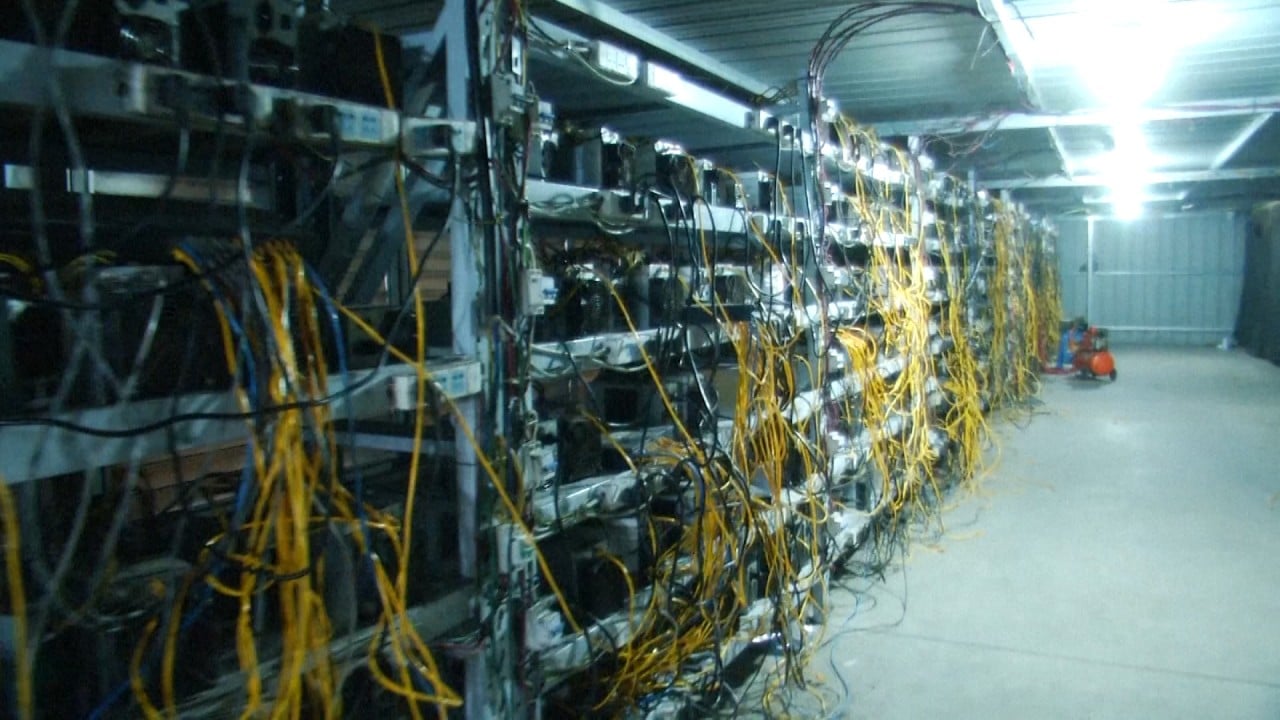
01:07
Chinese police seize 4,000 bitcoin-mining computers that illegally tapped US$3 million worth of electricity

China’s massive bitcoin mining operation could undermine the nation’s efforts to reduce emissions unless the government steps in, according to a new study.
The annual energy consumption of China’s bitcoin miners is expected to peak in 2024 at about 297 terawatt-hours, or more than was used by Italy in 2016, the study said.
The mines’ annual carbon emissions are set to peak at 130 million tonnes in 2024, or more than the greenhouse gas emissions of the Czech Republic in 2016.
The study was published in the peer-reviewed journal Nature Communications on Tuesday by researchers from the University of the Chinese Academy of Sciences, Tsinghua University, Cornell University and the University of Surrey.
Mining for bitcoin is highly energy intensive. In China, most mines are located in resource-rich provinces like Inner Mongolia, Sichuan, Yunnan and Xinjiang, where electricity prices are low.
An analysis by Cambridge University in February estimated the industry consumed about 121 terawatt-hours a year, or nearly 0.5 per cent of the world’s energy production.
Bitcoin has been around since 2008 and its value has soared over the past year drawing a growing number of miners to the industry.
“The carbon emissions of this emerging industry have a potential hindering effect on China’s climate neutrality targets,” Jiang Shangrong, lead author of the study and a researcher with the University of the Chinese Academy of Sciences, was quoted as saying by China Science Daily on Wednesday.
China has set a goal for its carbon emissions to peak before 2030 and achieve carbon neutrality by 2060. As of April last year, the country accounted for more than 75 per cent of the world’s bitcoin mines around the world, and the mining hardware has evolved through several generations, the study said.
Initially, miners used the basic central processing unit on general purpose computers. Then they moved to graphic processing units, which offered more power, and later to application-specific integrated circuits.
The rapid hardware development and fierce competition significantly increased the capital expenditure for bitcoin mining but also led to massive energy consumption, the study said.
The research also compared commonly implemented carbon emission policies, including limiting bitcoin mining access, site regulation and implementing a carbon emission tax.
It found that site regulation was the most effective. In such a situation, bitcoin miners in coal-rich regions are persuaded to relocate to hydro-rich areas to take advantage of the relatively lower cost of surplus energy.
Under a carbon tax scenario, bitcoin miners would be charged double the usual rate for their emissions but the researchers said this would have only a limited effect in reducing carbon emission intensity.
“The evidence of bitcoin blockchain operation suggests that with the broader usage and application of blockchain technology, new protocols should be designed and scheduled in an environmentally friendly manner,” it said.
The team behind the study could not be reached on Wednesday.
Lin Boqiang, dean of Xiamen University’s China Institute for Studies in Energy Policy, who was not involved in the study said it would be hard for bitcoin miners to escape regulation by relocating to hydro-rich areas once China had assigned climate targets to individual provinces.
“When China’s climate targets are implemented at the provincial level, bitcoin mining will have no place to go,” he said. “Even renewable energy-rich provinces probably would not accept these projects because they are likely to favour energy-intensive projects that can contribute to the local economy.”
Last month, authorities in Inner Mongolia announced plans to ban all cryptocurrency mining by the end of April as they seek to meet their energy-saving targets.
The north China region was the only one of the 30 areas that failed to meet Beijing’s energy consumption and energy intensity targets in 2019.
“Bitcoin mines only consume electricity. They have no benefit to the local economy,” Lin said.